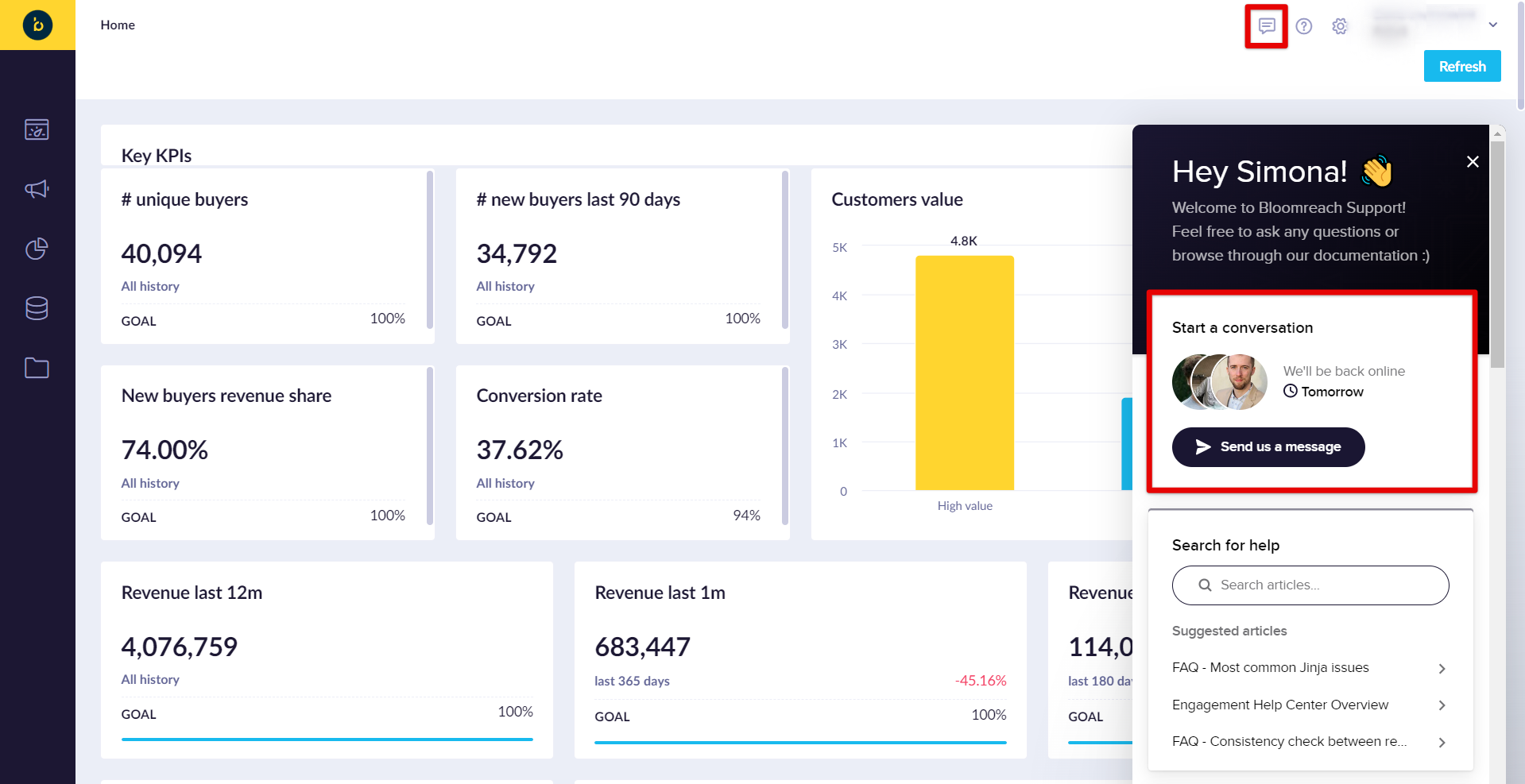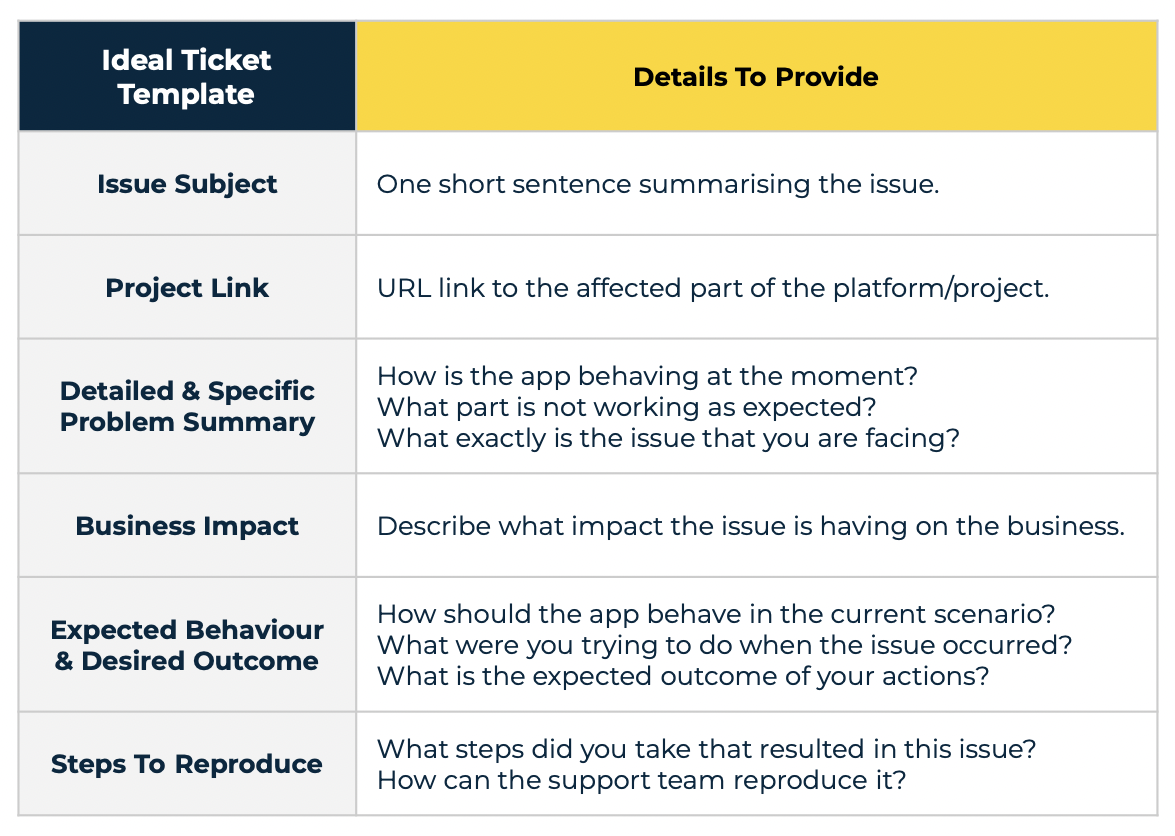Engagement Support
The Engagement Support team is available to all the platform users and ready to assist them with a broad scope of issues. This guide will help you understand the following:
- What types of questions can be answered by the support
- How to contact support
- How the support team is organized
Support scope
Some requests may need to be redirected to Client Services for paid consulting, depending on the complexity and time required for the resolution. If your request need a consultancy session, your CSM will help you to arrange all the necessary details.
Within the scope
The Engagement support team is available to assist customers with the following categories of requests:
- Any technical issues of varying degrees of severity that affect the use of the platform
- Assistance when the platform behavior is not functioning as expected
- Identification of bugs that are passed to product development for fixes
- General questions regarding the Engagement platform and its use
- Preliminary investigation of deliverability issues
- Assistance in building a use case
- Advice on how to code small solutions with JINJA
- EBQ - Troubleshooting, debugging data flow from platform to EBQ
- Mobile SDK: We assist with debugging SDK issues (e.g. In-app errors) and process bug reports related to SDK functionality. To be eligible for support for SDK-related issues, you must have updated it to the latest version and not modified the implementation code with custom solutions. Additionally, you’ll need to provide us access to your application or provide relevant app logs and implementation details. Please note Engagement support is the official channel for reporting mobile SDK-related bug reports and issues.
Out of scope
The Engagement support team are not available to assist customers with the following categories of request:
- Platform / Instance / Account / Project Administration:
- Creating, deleting, or managing accounts and projects
- Managing IDs (add, and edit settings for
soft_idorhard_idof the project) - Managing accesses for projects/accounts/instances, EBQ, or tools where Bloomreachers are not administrators
- Deleting data
- Changing the status of accounts/projects (hard lock, soft lock)
- Creating new projects or accounts
- Troubleshooting, debugging, or fixing:
- Custom code (JS, CSS, regexp, HTML, python)
- Custom integrations
- API endpoint of third parties which are not among the list of native integrations
- Custom implementation of tracking
- Software not developed by Engagement
- Creating use cases from scratch
- Creative consultancy (email templates designs, weblayers designs)
- Launch live scenarios, email campaigns, web layers, experiments, tags
- Advanced deliverability consulting
- Creation, migration, and setup of new domains for emailing service providers
- Help with the setup of new integrations
- EBQ - troubleshooting and debugging data in EBQ
- Mobile SDK - support team doesn't provide assistance with the implementation of SDK to a mobile app, e.g. how to include deep links support into a mobile app or how to include a specific component of the SDK in a mobile app.
Contacting the support
General information
You can contact support through the following channels:
1. Live chat - Engagement offers a live chat functionality with responses provided during agreed business hours. It is available for all users within the Engagement platform help center in the location highlighted below.

2. Email [email protected] - a direct email alias to the helpdesk is also available, with responses provided during agreed business hours. We recommend using this address only in the event that live chat is unavailable.
3. Phone - the phone option is available only for business-critical cases, reflected in the SLA.
Business hours
Standard Support: 9:00 am - 5:00 pm from Monday to Friday. Cases opened outside of business hours will be responded to the next business day. Supported timezones: GMT/BST, CE(S)T, ED(S)T, PD(S)T, MD(S)T, CD(S)T. The client is supposed to select 1 timezone.
Premium Support: 24x7 - all time zones included, weekends and holidays.
Language support
Support agents provide assistance in English, Russian or Slovak language.
Best practices
1. Provide specific examples and links to all related resources to ensure that any given request can be processed as effectively as possible and that the support team can recreate the issue.
2. Raise a support request for each individual issue. The aim is to keep the communication as clear and as effective as possible. By separating the issues, we can decrease the resolution time.

Ticket management
There are three levels of support for resolving the clients’ queries:
1. The first line of support (L1) - the first line of support resolves the majority of the requests. First-line support agents gather the necessary information, do the investigation, and, if possible, resolve the issue. In cases where first-line support is unable to do so, the issue will be escalated to the second line of support.
2. The second line of support (L2) - the second-line support, which continues with an in-depth investigation and provides updates about the resolution to the first-line agents. In cases where second-line support is unable to resolve the issue, it will be escalated to the third line of support.
3. The third line of support (L3) - the third-line support consists of on-call developers operating 24/7 who can solve the most advanced technical issues. They provide updates to second-line agents, who in turn inform the first-line agents.
When a member of the support team escalates the issue to a higher line of support (L2 or L3), they fill in an internal support ticket. As a client, you will not have direct access to the ticket. Instead, you will be informed about status changes via live chat.
It is quite common for our support to request a HAR (HTTP Archive) file to investigate an issue you are having closely. In order to do this, refer to the How to Generate a HAR File page and follow the guide depending on your browser.
Updated 5 months ago
